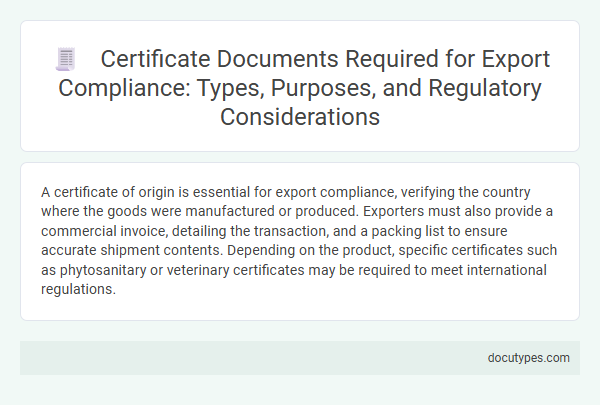A certificate of origin is essential for export compliance, verifying the country where the goods were manufactured or produced. Exporters must also provide a commercial invoice, detailing the transaction, and a packing list to ensure accurate shipment contents. Depending on the product, specific certificates such as phytosanitary or veterinary certificates may be required to meet international regulations.
Introduction to Certificate Documents in Export Compliance
Certificate documents play a vital role in ensuring export compliance by verifying that goods meet specific regulatory requirements. These documents help exporters and authorities maintain adherence to international trade laws and standards.
Several types of certificate documents are commonly required for export compliance, including Certificates of Origin, Compliance Certificates, and Export Licenses. Each certificate serves a unique purpose in validating the authenticity, quality, and legality of the exported products. Proper understanding and preparation of these certificates streamline the customs clearance process and reduce the risk of shipment delays or penalties.
Types of Certificates Required for Export
Export compliance requires specific types of certificate documents to verify that goods meet regulatory standards. These certificates ensure lawful international trade and facilitate customs clearance.
Common certificates include the Certificate of Origin, which verifies the country where the goods were produced. Exporters may also need an Export License, Certificate of Conformity, and Health or Phytosanitary Certificates depending on product type and destination.
Legal and Regulatory Framework Governing Certificates
Export compliance requires specific certificate documents that verify adherence to legal and regulatory frameworks set by national and international authorities. Common certificates include Certificates of Origin, Export Licenses, and Compliance Certificates, each serving to confirm authenticity and regulatory conformity. These documents ensure shipments meet customs requirements and mitigate risks of penalties or shipment delays in global trade.
Certificate of Origin: Purpose and Importance
What type of certificate document is needed for export compliance? A Certificate of Origin is essential to prove the country where the goods were manufactured. This document ensures compliance with trade regulations and qualifies shipments for preferential tariff treatment.
Export Licenses and Permits: Key Requirements
Export compliance requires specific certificate documents to ensure that goods meet regulatory standards before leaving a country. Understanding export licenses and permits is crucial for securing the correct documentation.
- Export License - A government-issued authorization required for shipping controlled goods internationally.
- Import Permit - Documentation ensuring compliance with destination country regulations and restrictions.
- Certificate of Origin - A document verifying the country where the goods were manufactured to satisfy trade agreements and tariffs.
Health and Sanitary Certificates for Exported Goods
Health and sanitary certificates are essential documents required for export compliance, ensuring that exported goods meet the destination country's health and safety standards. These certificates verify that products are free from contaminants and comply with relevant regulations to protect public health.
- Health Certificate - Certifies that products meet the health standards of the importing country and are safe for consumption or use.
- Sanitary Certificate - Confirms that the exported goods comply with sanitary regulations, including hygiene and disease control requirements.
- Veterinary Certificate - Required for animal products, this certifies that the goods are free from animal diseases and comply with veterinary health standards.
Obtaining the correct health and sanitary certificates is crucial for smooth customs clearance and access to international markets.
Safety and Quality Assurance Certificates
| Type of Certificate | Purpose | Key Requirements | Relevance to Export Compliance |
|---|---|---|---|
| Safety Certificate | Ensures products meet international safety standards | Compliance with industry-specific safety regulations, testing reports, hazard assessments | Verifies that exported goods are safe for use in the destination country, preventing legal issues and shipment delays |
| Quality Assurance Certificate | Confirms that products conform to specified quality benchmarks | Inspection reports, quality management system certifications (e.g., ISO 9001), batch consistency documentation | Demonstrates consistent product quality, facilitating acceptance by foreign customs and regulatory bodies |
| Certificate of Compliance | Proof that products meet contractual or regulatory standards | Third-party inspection results, conformity declarations, approved testing outcomes | Supports export clearance by confirming adherence to both exporting and importing country regulations |
Your export shipments require correct Safety and Quality Assurance Certificates to meet regulatory compliance, ensuring smooth international trade operations.
Authentication and Apostille Procedures
Export compliance requires specific certificate documents to validate the authenticity of goods and ensure legal adherence across borders. Authentication and apostille procedures are critical steps to certify these documents for international use.
- Certificate of Origin - Verifies the country where the exported goods were manufactured or produced to meet trade agreement requirements.
- Authentication - Involves the verification of the certificate by the issuing authority or embassy to confirm its legitimacy.
- Apostille - A specialized certification under the Hague Convention simplifying document acceptance in member countries by validating the document's origin and authenticity.
Best Practices for Document Management and Retention
For export compliance, the type of certificate document required depends on the specific goods and destination country, commonly including Certificates of Origin, Export Licenses, and Compliance Certificates. Proper document management involves organizing, categorizing, and securely storing all certification records to ensure quick retrieval and verification during audits. Retain these documents for a minimum of five years or as mandated by regulatory authorities to maintain compliance and avoid penalties.
What Type of Certificate Document Is Needed for Export Compliance? Infographic

